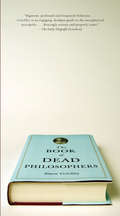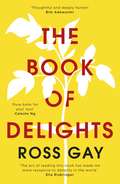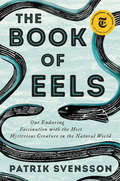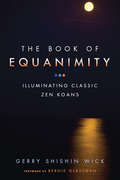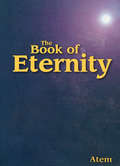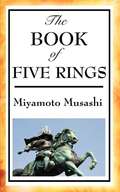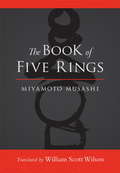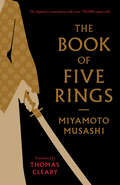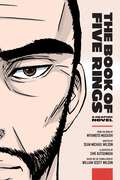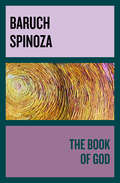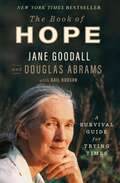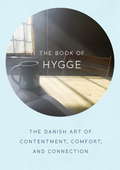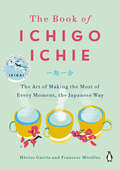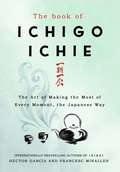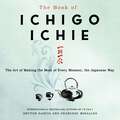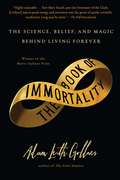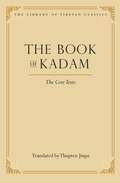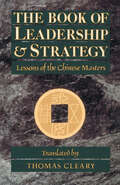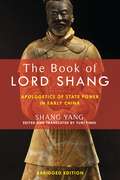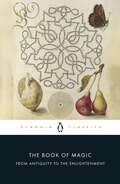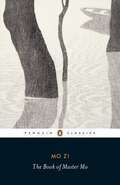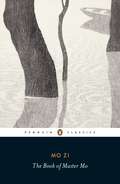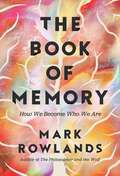- Table View
- List View
The Book of Dead Philosophers
by Simon CritchleyDiogenes died by holding his breath. Plato allegedly died of a lice infestation. Diderot choked to death on an apricot. Nietzsche made a long, soft-brained and dribbling descent into oblivion after kissing a horse in Turin. From the self-mocking haikus of Zen masters on their deathbeds to the last words (gasps) of modern-day sages, THE BOOK OF DEAD PHILOSOPHERS chronicles the deaths of almost 200 philosophers--tales of weirdness, madness, suicide, murder, pathos and bad luck. In this elegant and amusing book, Simon Critchley argues that the question of what constitutes a 'good death' has been the central preoccupation of philosophy since ancient times. As he brilliantly demonstrates, looking at what the great thinkers have said about death inspires a life-affirming enquiry into the meaning and possibility of human happiness. In learning how to die, we learn how to live.
The Book of Delights: The Perfect Christmas Present for 2020
by Ross GayA NEW YORK TIMES BESTSELLERAs Heard on NPR's This American Life'The delights he extols here (music, laughter, generosity, poetry, lots of nature) are bulwarks against casual cruelties . . . contagious in their joy' New York TimesThe winner of the NBCC Award for Poetry offers up a spirited collection of short lyric essays, written daily over a tumultuous year, reminding us of the purpose and pleasure of praising, extolling, and celebrating ordinary wonders.Among Gay's funny, poetic, philosophical delights: a friend's unabashed use of air quotes, cradling a tomato seedling aboard an aeroplane, the silent nod of acknowledgement between the only two black people in a room. But Gay never dismisses the complexities, even the terrors, of living in America as a black man or the ecological and psychic violence of our consumer culture or the loss of those he loves. More than anything other subject, though, Gay celebrates the beauty of the natural world - his garden, the flowers peeking out of the sidewalk, the hypnotic movements of a praying mantis.The Book of Delights is about our shared bonds, and the rewards that come from a life closely observed. These remarkable pieces serve as a powerful and necessary reminder that we can, and should, stake out a space in our lives for delight.***'These charming, digressive "essayettes" surprise and challenge more than a reader might expect . . . experiences of "delight," recorded daily for a year, vary widely but yield revealing patterns through insights about everything from nature and the body to race and masculinity.' New Yorker'Pure balm for your soul. Savor one at a time every morning, this summer, or wolf them all down en masse on a gorgeous sunny day.' Celeste Ng'A reminder of what the personal essay is best at: finding the profound in the mundane . . . His delight is infectious. It's hard to read Gay and not to be won over.' Seattle Times
The Book of Eels: Our Enduring Fascination with the Most Mysterious Creature in the Natural World
by Patrik SvenssonPart H Is for Hawk, part The Soul of an Octopus, The Book of Eels is both a meditation on the world’s most elusive fish—the eel—and a reflection on the human conditionRemarkably little is known about the European eel, Anguilla anguilla. So little, in fact, that scientists and philosophers have, for centuries, been obsessed with what has become known as the “eel question”: Where do eels come from? What are they? Are they fish or some other kind of creature altogether? Even today, in an age of advanced science, no one has ever seen eels mating or giving birth, and we still don’t understand what drives them, after living for decades in freshwater, to swim great distances back to the ocean at the end of their lives. They remain a mystery.Drawing on a breadth of research about eels in literature, history, and modern marine biology, as well as his own experience fishing for eels with his father, Patrik Svensson crafts a mesmerizing portrait of an unusual, utterly misunderstood, and completely captivating animal. In The Book of Eels, we meet renowned historical thinkers, from Aristotle to Sigmund Freud to Rachel Carson, for whom the eel was a singular obsession. And we meet the scientists who spearheaded the search for the eel’s point of origin, including Danish marine biologist Johannes Schmidt, who led research efforts in the early twentieth century, catching thousands upon thousands of eels, in the hopes of proving their birthing grounds in the Sargasso Sea.Blending memoir and nature writing at its best, Svensson’s journey to understand the eel becomes an exploration of the human condition that delves into overarching issues about our roots and destiny, both as humans and as animals, and, ultimately, how to handle the biggest question of all: death. The result is a gripping and slippery narrative that will surprise and enchant.
The Book of Equanimity
by Bernie Glassman Gerry Shishin WickThe Book of Equanimity contains the first-ever complete English language commentary on one of the most beloved classic collections of Zen teaching stories (koans), making them vividly relevant to spiritual seekers and Zen students in the twenty-first century. Continually emphasizing koans as effective tools to discover and experience the deepest truths of our being, Wick brings the art of the koan to life for those who want to practice wisdom in their daily lives. The koan collection Wick explores here is highly esteemed as both literature and training material in the Zen tradition, in which koan-study is one of two paths a practitioner might take. This collection is used for training in many Zen centers in the Americas and in Europe but has never before been available with commentary from a contemporary Zen master. Wick's Book of Equanimity includes new translations of the preface, main case and verse for each koan, and modern commentaries on the koans by Wick himself.
The Book of Eternity
by AtemA journey of discovery of the universe and of the self.'The Book Of Eternity' is a philosophy which is spiritual yet not religious; concise rather than verbose, and resonates with a part of us which is just beginning to awaken.A book not only to be read but to be experienced; and once experienced, never to be forgotten.
The Book of Five Rings
by Miyamoto MusashiThere are various Ways. There is the Way of salvation by the law of Buddha, the Way of Confucius governing the Way of learning, the Way of healing as a doctor, as a poet teaching the Way of Waka, tea, archery, and many arts and skills. Each man practises as he feels inclined. It is said the warrior's is the twofold Way of pen and sword, and he should have a taste for both Ways. Even if a man has no natural ability he can be a warrior by sticking assiduously to both divisions of the Way. Generally speaking, the Way of the warrior is resolute acceptance of death.
The Book of Five Rings
by Miyamoto Musashi William Scott Wilson Shiro TsujimuraAlong with Sun Tzu's The Art of War, The Book of Five Rings is considered to be one of the most insightful texts on the subtle arts of confrontation and victory to emerge from Asia. Composed in 1643 by the famed duelist and undefeated samurai Miyamoto Musashi, The Book of Five Rings analyzes the process of struggle and mastery over conflict that underlies every level of human interaction. For Musashi, the way of the martial arts was a mastery of the mind rather than simply technical prowess--and it is this path to mastery that is the core teaching in The Book of Five Rings. This brilliant manifesto is written not only for martial artists but for anyone who wants to apply the timeless principles of this text to their life.
The Book of Five Rings: A Classic Text on the Japanese Way of the Sword (Shambhala Library)
by Miyamoto MusashiThe Book of Five Rings is one of the most insightful texts on the subtle arts of confrontation and victory to emerge from Asian culture. Written not only for martial artists but for anyone who wants to apply the timeless principles of this text to their life, the book analyzes the process of struggle and mastery over conflict that underlies every level of human interaction. The Book of Five Rings was composed in 1643 by the famed duelist and undefeated samurai Miyamoto Musashi. Thomas Cleary's translation is immediately accessible, with an introduction that presents the spiritual background of the warrior tradition. Along with Musashi's text, Cleary translates here another important Japanese classic on leadership and strategy, The Book of Family Traditions on the Art of War by Yagyu Munenori, which highlights the ethical and spiritual insights of Taoism and Zen as they apply to the way of the warrior.
The Book of Five Rings: A Graphic Novel
by Miyamoto Musashi Sean Michael WilsonA graphic novel retelling of the classic martial arts manifesto on swordsmanship, strategy, and winning—by the legendary samurai Miyamoto Musashi This graphic novel version of The Book of Five Rings, the iconic book of confrontation and victory by the famed seventeenth-century duelist and undefeated samurai Miyamoto Musashi, illuminates this brilliant manifesto, which has long inspired martial artists and anyone interested in cultivating a strategic mind. With evocative drawings and a distilled but faithful text adapted by acclaimed manga writer Sean Michael Wilson, The Book of Five Rings comes alive both as a guide to swordsmanship and strategy, and as a view into Musashi&’s world.
The Book of God
by Baruch SpinozaTranslated by Dr. A. Wolf from the Dutch [version of the author&’s Tractatus de Deo et homine] and edited and with an introduction by Dagobert D. Runes. Spinoza is today considered the Philosopher of Modern Times, as Aristotle was the Philosopher of Antiquity. In spite of which, he remains the best known and least read of the great thinkers.The Book of God, one of his earliest works, came to light only a hundred years ago in two slightly varying Dutch manuscripts. Its youthful author lived in turbulent times, when the Western world was torn by civil and religious strife, and bullies, bigots and pseudo-prophets vied for the ear of a fearful people. While Europe was in an uproar over the right church, Spinoza was seeking the right God. This book is the first known report of his findings. Appearing like a draft for his later Ethics, it is a Guide for the Bewildered. Those who see in philosophy no more than an intellectual exercise will have no difficulty dismissing it. But those imbued with the longing for a better and freer life will find here a most rewarding fountain of faith.
The Book of God
by Baruch SpinozaTranslated by Dr. A. Wolf from the Dutch [version of the author&’s Tractatus de Deo et homine] and edited and with an introduction by Dagobert D. Runes. Spinoza is today considered the Philosopher of Modern Times, as Aristotle was the Philosopher of Antiquity. In spite of which, he remains the best known and least read of the great thinkers.The Book of God, one of his earliest works, came to light only a hundred years ago in two slightly varying Dutch manuscripts. Its youthful author lived in turbulent times, when the Western world was torn by civil and religious strife, and bullies, bigots and pseudo-prophets vied for the ear of a fearful people. While Europe was in an uproar over the right church, Spinoza was seeking the right God. This book is the first known report of his findings. Appearing like a draft for his later Ethics, it is a Guide for the Bewildered. Those who see in philosophy no more than an intellectual exercise will have no difficulty dismissing it. But those imbued with the longing for a better and freer life will find here a most rewarding fountain of faith.
The Book of Hope: A Survival Guide for Trying Times (Global Icons Series)
by Jane Goodall Douglas AbramsIn a world that seems so troubled, how do we hold on to hope? <p><p> Looking at the headlines—the worsening climate crisis, a global pandemic, loss of biodiversity, political upheaval—it can be hard to feel optimistic. And yet hope has never been more desperately needed. <p><p> In this urgent book, Jane Goodall, the world's most famous living naturalist, and Douglas Abrams, the internationally bestselling co-author of The Book of Joy, explore through intimate and thought-provoking dialogue one of the most sought after and least understood elements of human nature: hope. <p><p> In The Book of Hope, Jane focuses on her "Four Reasons for Hope": The Amazing Human Intellect, The Resilience of Nature, The Power of Young People, and The Indomitable Human Spirit. <p><p> Drawing on decades of work that has helped expand our understanding of what it means to be human and what we all need to do to help build a better world.
The Book of Hygge
by Louisa Thomsen BritsThe most beautiful guide to the Danish custom of hygge, the everyday life philosophy for better living. Hygge is a feeling of belonging and warmth, a moment of comfort and contentment. This beautiful little book will help you to find hygge and embrace it every day. Make a pot of coffee, relax in your favourite chair and discover for yourself how life is better with hygge. 'Best [book] for the philosophy of hygge' You Magazine '. . . a philosophy for mindful living' The Guardian 'Her book is a thing of beauty' Irish Examiner
The Book of Ichigo Ichie: The Art of Making the Most of Every Moment, the Japanese Way
by Francesc Miralles Héctor GarcíaFind happiness by living fully in the present with this definitive guide to ichigo ichie--the Japanese art of making the most of every moment--from the bestselling authors of Ikigai.Every moment in our life happens only once, and if we let it slip away, we lose it forever--an idea captured by the Japanese phrase ichigo ichie (pronounced itchy-GO itchy-A). Often spoken in Japan when greeting someone or saying goodbye, to convey that the encounter is unique and special, it is a tenet of Zen Buddhism and is attributed to a sixteenth-century master of the Japanese tea ceremony, or "ceremony of attention," whose intricate rituals compel us to focus on the present moment.From this age-old concept comes a new kind of mindfulness. In The Book of Ichigo Ichie, you will learn to... • appreciate the beauty of the fleeting, the way the Japanese celebrate the cherry blossoms for two weeks every April, knowing they'll have to wait a whole year to see them again; • use all five senses to anchor yourself in the present, helping you to let go of fear, sadness, anger, and other negative emotions fueled by fixating on the past or the future; • be alert to the magic of coincidences, which help us find meaning among the disconnected events of our lives; • use ichigo ichie to help you discover your ikigai, or life's purpose--because it's only by learning to be present, to be tuned into what catches your attention and excites you in the moment, that you can identify what it is that most motivates you and brings you happiness.Every one of us contains a key that can open the door to attention, harmony with others, and love of life. And that key is ichigo ichie.
The Book of Ichigo Ichie: The Art of Making the Most of Every Moment, the Japanese Way
by Francesc Miralles Héctor GarcíaLearn to make every moment a once-in-a-lifetime experience with this definitive guide to the Japanese art of ichigo ichie, from the bestselling authors of Ikigai.'Ikigai urges individuals to simplify their lives by pursuing what sparks joy for them' (Marie '' Kondo) Every moment in our life happens only once, and if we let it slip away, we lose it forever-an idea captured by the Japanese phrase ichigo ichie. Often used to convey that the encounter is unique and special, it is a tenet of Zen Buddhism and is attributed to a sixteenth-century master of the Japanese tea ceremony, or 'ceremony of attention', whose intricate rituals compel us to focus on the present moment.From this age-old concept comes a new kind of mindfulness. In The Book of Ichigo Ichie, you will learn to use all five senses to anchor yourself in the present. Every one of us contains a key that can open the door to attention, harmony with others, and love of life. And that key is ichigo ichie.'This is a great little book to lift the spirits and remind us of the importance of living in the 'now', not worrying about the past or future.' - 5* Reader Review'This book should act as a wakeup call. Make each now a sacred moment. Pay attention! Make each moment special!' - 5* Reader Review'The authors of Ikigai have offered another brief and masterful addition for those seeking out a simpler and more fulfilling life.' - 5* Reader Review
The Book of Ichigo Ichie: The Art of Making the Most of Every Moment, the Japanese Way
by Francesc Miralles Héctor GarcíaLearn to make every moment a once-in-a-lifetime experience with this definitive guide to the Japanese art of ichigo ichie, from the bestselling authors of Ikigai.Every moment in our life happens only once, and if we let it slip away, we lose it forever--an idea captured by the Japanese phrase ichigo ichie. Often spoken in Japan when greeting someone or saying goodbye, to convey that the encounter is unique and special, it is a tenet of Zen Buddhism and is attributed to a sixteenth-century master of the Japanese tea ceremony, or 'ceremony of attention', whose intricate rituals compel us to focus on the present moment.The Book of Ichigo-Ichie: The Art of Living of Making the Most of Every Moment, the Japanese Way is an inspirational work which shows us how to:* Free ourselves from the past and the future and to make each moment something unique.* Bring into our lives the Zen that Steve Jobs learned from a Japanese master, and which was key to his success.* Turn coincidences into a tool for conscious magic.* Create unforgettable moments in professional and personal circles.* Improve our relationships with a new type of mindfulness.* Open the floodgates to the flow of creativity whenever we need it.The Book of Ichigo Ichie will help you find your ikigai.(P) 2020 Quercus Editions Limited
The Book of Immortality
by Adam Leith GollnerThe author of the critically acclaimed The Fruit Hunter--soon to be a documentary--weaves together religion, science, and mythology in a rich and fascinating exploration of the most universal of human obsessions: immortality.From vampires to the billion-dollar anti-aging industry, our culture is perennially fascinated with the concept of eternal life. Now, Adam Gollner delves into a strange array of contemporary and historical characters and cults, religions and myths, and businesses all devoted to some form of immortality. Beginning at a futuristic costume party (the theme being the year 2068) thrown by a group of immortalists in California, his journey takes him to David Copperfield's archipelago in the Bahamas, where Copperfield claims to have found the fountain of youth. Along the way Gollner visits St. Augustine, Florida, where Ponce de Leon died searching for said fountain; Harvard University, where he attends an anti-aging symposium; the Esalen Institute in California where he meets a medium, a priest, a rabbi, a magician, and a whole host of quirky characters who embody our obsession with escaping death. An incredible thinker with "the talents of an investigative journalist, poet, travel writer, and humorist grafted onto one unusual specimen" (Mary Roach, The New York Times Book Review), Adam Gollner has written a provocative, rollicking, and revelatory examination of our age-old notion of living forever.
The Book of Immortality: The Science, Belief, and Magic Behind Living Forever
by Adam Leith GollnerWhat have we not done to live forever? The critically acclaimed author of The Fruit Hunters--now an award-winning documentary film--weaves together religion, science, and mythology in a gripping exploration of the most universal of human obsessions: immortality.What have we not done to live forever? Adam Leith Gollner, the critically acclaimed author of The Fruit Hunters, weaves together religion, science, and mythology in a gripping exploration of the most universal of human obsessions: immortality. Raised without religion, Adam Leith Gollner was struck by mankind's tireless efforts to cheat aging and death. In a narrative that pivots between profundity and hilarity, he brings us into the world of those whose lives are shaped by a belief in immortality. From a Jesuit priest on his deathbed to antiaging researchers at Harvard, Gollner-- sorting truth from absurdity--canvasses religion and science for insight, along with an array of cults, myths, and fringe figures. He journeys to David Copperfield's archipelago in the Bahamas, where the magician claims to have found "a liquid that reverses genes." He explores a cryonics facility, attends a costume party set in the year 2068 with a group of radical life-extensionists, and soaks in the transformative mineral waters at the Esalen Institute. Looking to history, Gollner visits St. Augustine, Florida, where Ponce de León is thought to have sought the Fountain of Youth. Combining immersive reporting, rigorous research, and lyrical prose, Gollner charts the rise of longevity science from its alchemical beginnings to modern-day genetic interventions. He delves into the symbolic representation of eternal life and its connection to water. Interlaced throughout is a compelling meditation on the nature of belief, showing how every story we tell about immortality is a story about the meaning of death. "Part journalist, part detective, part scientist." (New York Post). Adam Leith Gollner has written a rollicking and revelatory examination of our age-old notion of living forever.
The Book of Kadam
by Thupten JinpaThe Kadam school of Tibetan Buddhism emerged in the eleventh century from the teachings of the Indian master Atisa and his principal Tibetan student, Dromtonpa. Although it no longer exists as an independent school, Kadam's teachings were incorporated into the four major schools of Tibetan Buddhism and are still prized today for their unique practical application of the bodhisattva's altruistic ideal in everyday life. One of the most cherished teachings stemming from Atisa and Dromtonpa is the collection of esoteric oral transmissions enshrined in The Book of Kadam. This volume includes the core texts of the Book of Kadam, notably the twenty-three-chapter dialogue between Atisa and Dromtonpa that is woven around Atisa's Bodhisattva's Jewel Garland, as well as complementary texts that illuminate the history and practices of the Kadam tradition.
The Book of Leadership and Strategy: Lessons of the Chinese Masters
by Thomas ClearyThe subtle arts of management and leadership have been developed over thousands of years by the Chinese. The Book of Leadership and Strategy represents the Taoist culmination of this long tradition and is one of the most prestigious works of ancient Chinese thought. Collected here are insightful teachings on the challenges of leadership on all levels, from organizational management to political statecraft. The translator, Thomas Cleary, has chosen and arranged these teachings to emphasize the most valuable lessons of Taoist wisdom for modern Western readers. Like Cleary's best-selling translation of The Art of War by Sun Tzu, this work will serve as an enlightening guide for people in business, politics, and government.
The Book of Lord Shang: Apologetics of State Power in Early China (Translations from the Asian Classics)
by Yang ShangCompiled in China in the fourth–third centuries BCE, The Book of Lord Shang argues for a new powerful government to rule over society and turn every man into a diligent tiller and valiant soldier. Creating a “rich state and a strong army” will be the first step toward unification of “All-under-Heaven.” These ideas served the state of Qin that eventually created the first imperial polity on Chinese soil. In Yuri Pines’s translation, The Book of Lord Shang’s intellectual boldness and surprisingly modern-looking ideas shine through, underscoring the text’s vibrant contribution to global political thought.The Book of Lord Shang is attributed to the statesman and theorist Shang Yang and his followers. It epitomizes the ideology of China’s so-called Legalist School of thought. In the ninety years since the work’s previous translation, major breakthroughs in studies of the book’s dating and context have recast our understanding of its messages. Pines applies these advances to a whole new reading of the text’s content and function in the sociopolitical life of its times and subsequent centuries. This abridged and revised edition of Pines’s annotated translation is ideal for newcomers to the book while also guiding early Chinese scholars and comparatists. It highlights the text’s practical success and its influence on political thought and political practice in traditional and modern China.
The Book of Magic: From Antiquity to the Enlightenment
by Brian Copenhaver'. . . as when iron is drawn to a magnet, camphor is sucked into hot air, crystal lights up in the Sun, sulfur and a volatile liquid are kindled by flame, an empty eggshell filled with dew is raised towards the Sun . . .'An odd feature of the Bible is that it is full of stories featuring forms of magic and possession - from Joseph battling with Pharaoh's wizards to the supernatural actions of Jesus and his disciples. As, over the following centuries, the Christian church attempted to stamp out 'deviant' practices, there was a persistent interest in magic that drew strength from this Biblical validation. A strange blend of mumbo-jumbo, fraud and deeply serious study, magic was central to the European Renaissance, fascinating many of its greatest figures. Brian Copenhaver's wonderful anthology will be welcomed by everyone from those with the most casual interest in the magical tradition to anyone drawn to the Renaissance and the tangled, arcane roots of the scientific tradition.
The Book of Master Mo
by Ian JohnstonA key work of ancient Chinese philosophy is brought back to life in Ian Johnston's compelling, definitive translation. Very little is known about Master Mo, or the school he founded. However, the book containing his philosophical ideas has survived centuries of neglect and is today recognised as a fundamental work of ancient Chinese philosophy. The book contains sections explaining the ten key doctrines of Mohism; lively dialogues between Master Mo and his followers; discussion of ancient warfare; and an extraordinary series of chapters that include the first examples of logic, dialectics and epistemology in Chinese philosophy. The ideas discussed in The Book of Master Mo - ethics, anti-imperialism, and a political hierarchy based on merit - remain as relevant as ever, and the work is vital to understanding ancient Chinese philosophy.
The Book of Master Mo
by Mo ZiA key work of ancient Chinese philosophy is brought back to life in Ian Johnston's compelling and definitive translation, new to Penguin Classics. Very little is known about Master Mo, or the school he founded. However, the book containing his philosphical ideas has survived centuries of neglect and is today recognised as a fundamental work of ancient Chinese philosophy. The book contains sections explaining the ten key doctrines of Mohism; lively dialogues between Master Mo and his followers; discussion of ancient warfare; and an extraordinary series of chapters that include the first examples of logic, dialectics and epistemology in Chinese philosophy. The ideas discussed in The Book of Master Mo - ethics, anti-imperalism, and a political hierarchy based on merit - remain as relevant as ever, and the work is vital to understanding ancient Chinese philosophy.Translator Ian Johnston has an MA in Latin, a PhD in Greek and a PhD in Chinese, and was Associate Professor of Neurosurgery at Sydney University until his retirement. He has published translations of Galen's medical writings, early Chinese poetry (Singing of Scented Grass and Waiting for the Owl), and early Chinese philosophical works (the Mozi and - with Wang Ping - the Daxue and Zhongyong). In 2011 he was awarded the NSW Premier's Prize and the PEN medallion for translation.Unlike previous translations, this version includes the complete text. It also includes an introduction and explanatory end notes. 'A landmark endeavour' Asia Times'A magnificent and valuable achievement' Journal of Chinese Studies'Eminently readable and at the same time remarkably accurate...Johnston's work will be the standard for a long time' China Review International'Compelling and engaging reading...while at the same time preserving the diction and rhetorical style of the original Chinese' New Zealand Journal of Asian Studies
The Book of Memory: How We Become Who We Are
by Mark RowlandsA brilliant journey through the nature of memory, helping us understand how what is lost—and what is remembered—shapes who we are.In this revelatory and intimate exploration of the way memory works, Mark Rowalds, author of The Philosopher and the Wolf, reveals how memories aren&’t fixed. They soften and consolidate—and are distorted—each time we revisit them, even those memories most deeply engrained. The way we call on memory is closer to a "negotiation with the past." From episodic memories like "shining islands in dark waters" and forgotten "Rilkean" memories that underpin our personalities and essential style to the memories we might hold that have been authored by others close to us, The Book of Memory draws on philosophical argument, a range of writers and thinkers, the latest neurological research, and psychology experiments to chart how memories are made, lost and remembered, with important consequences for how we understand ourselves.
